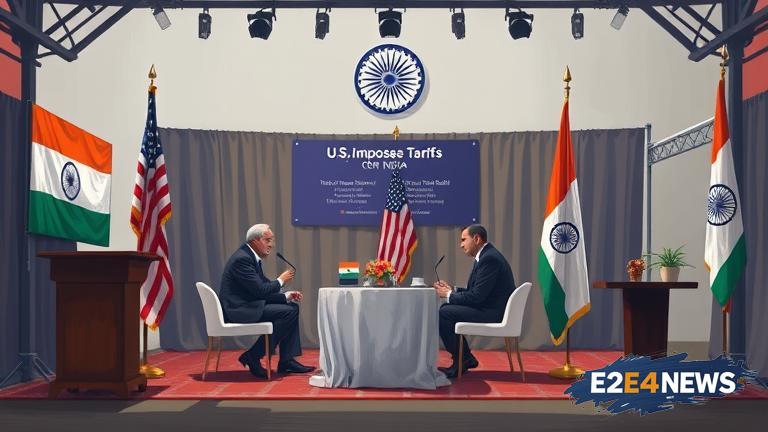The United States has hit India with 25% tariffs on certain goods, marking a significant escalation in trade tensions between the two countries. The move comes as trade talks between the US and India have stalled, with both sides failing to reach an agreement on key issues. The tariffs, which were announced by the US Trade Representative’s office, will affect a range of Indian products, including textiles, chemicals, and metals. The decision to impose tariffs is seen as a major blow to India’s economy, which is already facing significant challenges. The Indian government has expressed disappointment and concern over the US move, with officials saying that it will harm bilateral trade relations. The US has been seeking greater access to India’s markets, particularly in the areas of agriculture and pharmaceuticals. However, India has been resistant to US demands, citing concerns over the impact on its domestic industries. The trade tensions between the US and India have been simmering for months, with both sides engaging in a war of words over issues such as tariffs, subsidies, and market access. The US has been critical of India’s trade practices, accusing the country of unfairly protecting its domestic industries. India, on the other hand, has accused the US of trying to bully it into accepting unfavorable trade terms. The imposition of tariffs is likely to have significant implications for bilateral trade relations, with Indian exporters facing higher costs and reduced competitiveness in the US market. The move is also likely to affect US companies that rely on Indian imports, with higher tariffs leading to increased costs and reduced profitability. The Indian government has said that it will take all necessary measures to protect its interests and respond to the US move. The country’s trade ministry has announced that it will impose retaliatory tariffs on US goods, although the details of the measures have not been announced. The trade tensions between the US and India are part of a broader trend of rising protectionism and trade tensions globally. The US has been engaged in a trade war with China, with both sides imposing tariffs on each other’s goods. The EU has also imposed tariffs on US goods, citing concerns over US trade practices. The rise in trade tensions has significant implications for the global economy, with the World Trade Organization warning of a potential slowdown in trade growth. The US and India have a long-standing trade relationship, with bilateral trade totaling over $140 billion in 2020. However, the relationship has been strained in recent months, with both sides engaging in a series of trade disputes. The imposition of tariffs is likely to further strain the relationship, with Indian officials saying that it will take time to repair the damage. The Indian government has called for a negotiated settlement to the trade dispute, with officials saying that they are willing to engage in talks to resolve the issues. However, the US has said that it will not back down on its demands, citing concerns over India’s trade practices. The trade tensions between the US and India are likely to have significant implications for the global economy, with the potential for a broader trade war. The World Trade Organization has warned of the dangers of rising protectionism, citing concerns over the impact on global trade growth. The US and India must work together to resolve their trade differences and prevent a further escalation of tensions. The imposition of tariffs is a significant setback to bilateral trade relations, but it is not too late to repair the damage. Both sides must engage in constructive dialogue and work towards a negotiated settlement that addresses the concerns of both parties.
